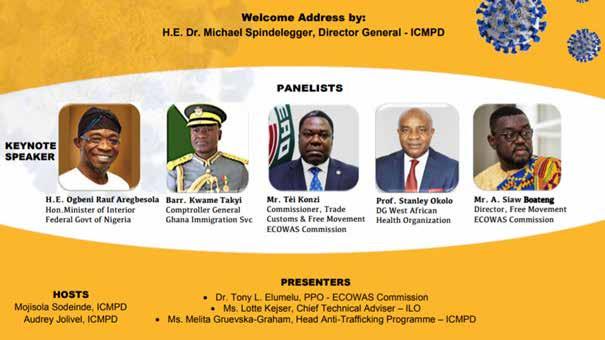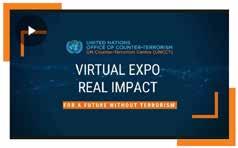
12 minute read
Impact of Covid-19 on the ECOWAS Free Movement Protocol and the Regional Integration Agenda
Impact on the Movement and the Integration of Covid - 1 9 ECOWAS Free Protocol Regional Agenda
The Economic Community of West African States (ECOWAS) and the International Centre for Migration Policy Development (ICMPD) recently organized a webinar to discuss the impact of COVID-19 on one of ECOWAS’s main instruments for regional integration, the Free Movement Protocol. While the coronavirus represents a global emergency, countries around the world immediately closed their borders to protect their citizens and prevent the spread of the virus. This raises the issue of regional cooperation and possible roadmap for future response to similar emergencies. Two distinguished personalities, H.E. Dr. Michael Spindelegger, Director General, ICMPD and H.E Ogbeni Rauf Aregbesola, Nigerian Minister of Interior took turns to set the context for presentations and discussions.
Advertisement
This was followed by presentations by four expert speakers and what follows is a summary of their presentations:
Dr. Tony Elumelu (PPO, Free Movement Directorate-ECOWAS): Towards a common immigration policy and Integrated Border Management taking into consideration migration and health.
Dr. Elumelu commenced his presentation by providing a context to the ECOWAS Free Movement Protocol. Over the years, the ECOWAS Commission has consistently and progressively introduced a series of initiatives that would strengthen its regional integration plan, including the principle of free movement of persons, goods and services in the region. The elaboration of the ECOWAS Common Approach on Migration in 2008 has guided several actions including the introduction of a unified template for travel document application, the phased implementation of the Joint Border Post Programme, and the implementation of a common biometric identification card to facilitate intra-regional mobility. However, like many countries across the globe, ECOWAS Member State are not insulated from the current pandemic, and one of the measures taken by individual MS was to restrict the movement of people both internally and across international borders. This was in contradiction to the ECOWAS Free Movement Protocol, restricting not only the free movement of persons within the sub-region, but also restricting economic activities. Dr Elumelu argued that the COVID-19 pandemic would go down in history as a pandemic that has changed the world in many forms. The analyses of the effects of the COVID-19 disease are ongoing and may not yet reveal the full extent of the economic as well as the social impact on communities. As global economies and regional bodies begin to take stock 6 of the effects, there is already a growing realization on the toll this is having on the general population. In the West Africa region, the challenges are real for the millions of community citizens
whose livelihoods depend on the daily movement of trade across the borders. The same applies to member states whose economies are dependent on the movement of goods and services within the region. With the gradual easing of restrictions, measures or guidelines to ensure safe travels both at the pre-departure and post arrival stages must be applied at all entry posts, including maritime borders.
Professor Stanley OKOLO (Director General, West African Health Organization): Finding a balance between the health emergency and cross-border migration in the context of the ECOWAS Free Movement Protocol.
Prof. Okolo began by providing a status update on the evolution of COVID-19 cases in the ECOWAS region. Three months into the outbreak, the rate of transmission in West Africa differs significantly from earlier predictions. As at 25 May 2020, there were a total of 29,772 confirmed cases, 17,318 active cases, 11,827 recovered and a total of 627 deaths. These figures show that the rate of transmission of the disease is relatively low, compared to other regions of the world. Although, the testing capacity in West Africa is very low, it does not fully explain the dynamics that is playing out in sub-Sahara Africa. However, with very poor health infrastructure and weak health management systems, there are legitimate concerns that the effect of the pandemic in Africa would
be devastating. People living in slums and shantytowns will not have the luxury to practice physical distancing as a non-pharmaceutical preventive measure. In addition, while the focus is on COVID-19, there are patients with other pathological illnesses who are struggling to get adequate care. As far back as 2005, the World Health Organization (WHO) had published a Handbook for Public Health Capacity Building at Ground-crossing and Cross-Border Collaboration.
Furthermore, in June 2019, WAHO published the Regional Pandemic Response Plan drawing experience from both the WHO guidelines and the Ebola case management successes. The Ebola outbreak in 2015, mainly affected three ECOWAS Member State - Guinea, Liberia and Sierra Leone. Contact tracing and isolation strategies were effectively utilized in managing the outbreak. In March 2020, the WHO released an updated guideline on the Management of Ill Travelers at Points of Entry in the context of COVID-19.
While sub-Sahara Africa may not have enough resources and testing capacity to cover a significant proportion of it population, active surveillance, early detection, isolation and case management remain the best options. These measures are practical and were successfully implemented at the various entry points during the Ebola outbreak. In the case of COVID-19, the border closure policy adopted by ECOWAS Member States may pose some challenges by inhibiting the possibility of contact tracing and data sharing. At the moment, the wave of transmission of the Coronavirus disease in subSahara Africa is relatively low and if this trend continues, it will be a major opportunity for public health researchers who will need to determine the cause of this peculiar pattern. However, there are still valid concerns that many African communities may experience a spike in the transmission rate if conscious measures are not taken to help communities prevent the spread of the disease. African countries need to strike a balance between re-opening the economy and curtailing the spread of the disease. Personal hygiene and the use of facemasks are the minimum requirements while public health authorities continue to look for an effective medical remedy. The WAHO has advised national authorities to base their decisions to ease the lockdown on scientific data as it relates to the spread of the virus.

Ms. Lotte Kejser: Chief Technical Adviser, International Labour Organization: ILO Impact of COVID-19 pandemic on Migrants and Youth employment
Ms. Lotte shared some insights on best practices and lessons learned from similar situations. Ms Lotte started the presentation by comparing the employment situation in West Africa before COVID-19 and the current state of employment. About 80% of the working population are in the informal sector some of whom are employed in small and medium sized enterprises which generates more than 4% of GDP. The population of the region
is estimated at 400 million and it is projected to double by 200 Million by 2050 with a growth rate of 2.7%. Almost 50% of the population are children between age 0 and14 and 20% are between 15-24 years implying a 50% youthful population between the age 15 and 34. The demography of the region gives it a hypothetical advantage in terms of the survival rate for COVID-19 infection assuming that the older population are more susceptible to the disease. Perhaps this reality marginally contributes to the slow rate of infection so far in the region. However, with over 50% unemployment and underemployment rates and the lack of social support for the unemployed, the productivity rate and income distribution among the youth population is low. Youths account for 60% of the unemployment rate and this is twice as high for women than for men. Given that a larger percentage of the working population earn their livelihood daily, the reality is that majority of the population will not earn any income to sustain themselves during the lockdown. At the same time, the drastic reduction in diaspora remittances has complicated the means of livelihood of many families.
Ms. Melita Gruevska-Graham, Head Anti-Trafficking Programme - ICMPD: Impact of the COVID-19 Pandemic and the Protection of Vulnerable groups
Ms. Melita started the conversation by providing an overview of the different initiatives and programmes ICMPD is currently committed to in region. She took time to share her very deep insight about the peculiar vulnerabilities for the different categories of the migrant population. West Africa has always been a region of high human mobility and about 80% of the migratory flow is intra-regional. Interestingly over the past 10 years, the migrants’ profiles are changing and becoming more diversified to include more women and Youths in a context of mixed migration flow. A major concern is the high irregular migration incidence 8 specific to certain communities and driven by the need to escape the real existential threat of poverty, to find a better life for their families.

This is what has fueled the enterprise of migrant smuggling and human trafficking and the very horrors of modern day slavery. Many others are victims of conflict displaced within their own communities and with no hope in sight for a durable solution. The ICMPD led Rabat Process is currently finalizing an assessment of anti-trafficking gaps, needs, and good practices in the 15 Member States of ECOWAS and Mauritania. The assessment is envisaged to provide a toolbox of transferable practices, so that Rabat Process partners can build upon successes and avoid pitfalls in existing country trafficking responses.
Security Council bodies issue joint report on measures taken by States to disrupt terrorism financing
In June 2020, the Counter-Terrorism Committee Executive Directorate (CTED) and the Analytical Support and Sanctions Monitoring Team pursuant to resolutions 1526 (2004) and 2253 (2015) concerning Islamic State in Iraq and the Levant (ISIL) (Da’esh), Al-Qaida and the Taliban and associated individuals and entities, issued a joint report providing insight into measures taken by States to disrupt terrorism financing, including through the effective implementation of measures required by the relevant Council resolutions.
Based on responses from 112 Member States, the report highlights the commitment of Member States to denying terrorist groups access to funds and financial services, and stresses the important role played by United Nations sanctions measures (in particular, asset-freezing measures) in that regard.
Most States report having revised their counter-financing of terrorism (CFT) laws and having conducted terrorismfinancing risk assessments, working collaboratively with law enforcement, the judiciary, financial intelligence units, the private sector and the non-profit sector.
The responses suggest that States continue to face challenges with respect to, inter alia, the institutionalization of public/private partnerships, the integration of human rights obligations into CFT measures, and cooperation with civil society actors in developing policies to ensure risk-based supervision of the non-profit sector.
The report notes that only a handful of States have developed an institutional and operational response to paragraph 24 of Security Council resolution 2462 (2019), which notes that the implementation of CFT measures should take into account the potential effect of those measures on exclusively humanitarian activities, including medical activities, that are carried out by impartial humanitarian actors.
The joint report was prepared pursuant to paragraph 37 of resolution 2462 (2019), which is the first Council resolution devoted to preventing and suppressing terrorism financing.
The resolution’s adoption reflects the Council’s continued determination to assist States to deprive terrorists of funds, financial assets and economic resources, as well as to deny them access to the financial system and to other economic sectors vulnerable to terrorism financing.
CTED will continue to update and inform Member States and the public about the implementation of international CFT standards.
United Nations Counter-Terrorism Centre Launches Virtual Event in Midst of Covid-19
The UNCCT has launchged a cirtual event to take you on a interactive journey to explore the important work of the UN’s Centre of Excellence in preventing and countering terrorism and violent extremism across the globe.

UNCCT was established in September 2011 to promote international counter-terrorism cooperation and support Member States in the implementation of the Global Counter-Terrorism Strategy operating globally through a range of projects and programmes across 12 key thematic areas under the 4 pillars of the global counter terrorism strategy. UNCCT is currently implementing a total of 45 programmes and projects around the world. In 2019, the Centre organized 95 workshops and expert level meetings, engaging over 5,000 individuals.
View the virtual expo at www.un.org/counter-terrorism-expo
The ICMPD hosted a high-level public webinar on “the future of the AU-EU partnership on migration and mobility in light of the COVID-19 pandemic”. Distinguished panellists discussed the key issues related to the effects of COVID-19 on migration, mobility and displacement in Africa as well as its implications for the AU-EU Migration Partnership.
The ICMPD Director Migration Dialogues and Cooperation, Martijn Plum moderated the discussion with H.E. Amira Elfadil, Commissioner for Social Affairs, AUC, H.E. Cessouma Minata Samate, Commissioner for Political Affairs, AUC, H.E. Ylva Johansson, Commissioner for Home Affairs, EC. ICMPD Director General Michael Spindelegger gave a scene-setting opening speech in which he spoke about the current plans of EU-AU partnership: “The vision of bringing this [AU-EU] partnership to new heights was set by the European Commission in its March Communication ‘Towards a Comprehensive Strategy with Africa’.” With the newly emerged situation “[…] the EU’s Global Response to the COVID-19 from April 2020, is to focus on the most vulnerable people in Africa, including migrants, refugees, internally displaced persons and their host communities. This is certainly the right step into the right direction.” The high-level event was concluded by Ambassador Birgitte Markussen, Deputy Managing Director, EEAS.
WorldBorderSecurity.net




World Border Security Network (WorldBorderSecurity.net), a global network for agency officials at the borders. The purpose of the network is to encourage and facilitate inter-agency co-operation and communication. Members of the network will be able to:
• communicate securely • share information • share documents • share best practise

• view past presentations • keep up-to-date with the latest technology developments • share training opportunities • and more... WorldBorderSecurity.net is open to all World Border Security Congress government agency delegates past and present. Access is restricted to government and intergovernmental personnel; border, customs, immigration agency officials and specialist law enforcement officers. Non-delegate agency officials will also be welcome but by member invitation only.














